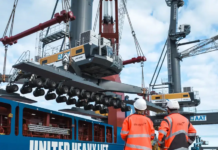
Research suggests that a small change in the temperature at which frozen food is transported and stored could have a significant environmental impact without compromising food safety or quality. Currently, most frozen food is stored at a standard of -18 °C, which has remained unchanged for 93 years. However, a move to -15°C could result in the following benefits:
- Saving 17.7 million metric tonnes of carbon dioxide per year is equivalent to the annual emissions of 3.8 million cars.
- Creating energy savings of around 25 terawatt-hours (TW/h), approximately 17.64% of the UAE’s electricity consumption.
- Cutting costs in the supply chain by at least 5% and up to 12% in some areas.
Experts from the International Institute of Refrigeration in Paris, the University of Birmingham, London South Bank University, and others conducted this research. It was supported by DP World, a leading global logistics firm and principal partner in COP28, who set up an industry-wide coalition to explore the feasibility of this change. The coalition, named Join the Move to -15°C, aims to redefine frozen food temperature standards to cut greenhouse gases, lower supply chain costs, and secure food resources for the growing global population.
The coalition has already received support from leading industry organizations, including AJC Group, A.P. Moller – Maersk, Daikin, Kuehne + Nagel International, Lineage, Mediterranean Shipping Company, and Ocean Network Express. By working together, the industry can find viable ways to achieve the sector’s shared net-zero ambition by 2050.
Freezing food extends its shelf life but comes with a significant environmental cost, as 2-3% more energy is required for every degree below zero at which that food is stored. The logistics industry is facing rising energy bills and working to decarbonize, but demand for frozen food is increasing. This is due to the evolving appetites of developing countries and price-conscious consumers seeking nutritious, tasty food at more affordable prices.
However, studies show that 12% of food produced annually is wasted due to a lack of refrigerated and frozen logistics, called the ‘cold chain’ in the industry, highlighting a significant need for greater capacity. Moreover, 1.3 billion tonnes of edible food is thrown away yearly, a third of global food production for human consumption. This issue is particularly acute in Sub-Saharan Africa and the Subcontinent, where food scarcity is a significant problem.
Join the Move to -15°C is an initiative to create a just transition, deploying accessible storage technologies globally to freeze food at sustainable temperatures to reduce food scarcity for vulnerable and developed communities alike. As the UN predicts a population of 9.7 billion by 2050, it is crucial to close the 56% gap in the global food supply between what was produced in 2010 and what will be needed in 2050. Cutting cold chain emissions is one way to secure future food resources while reducing greenhouse gas emissions and mitigating climate change.
อัพเดตข่าวสารและบทความที่น่าสนใจในอุตสาหกรรมโลจิสติกส์ก่อนใคร ผ่าน Line Official Account @Logistics Mananger เพียงเพิ่มเราเป็นเพื่อน @Logistics Manager หรือคลิกที่นี่














